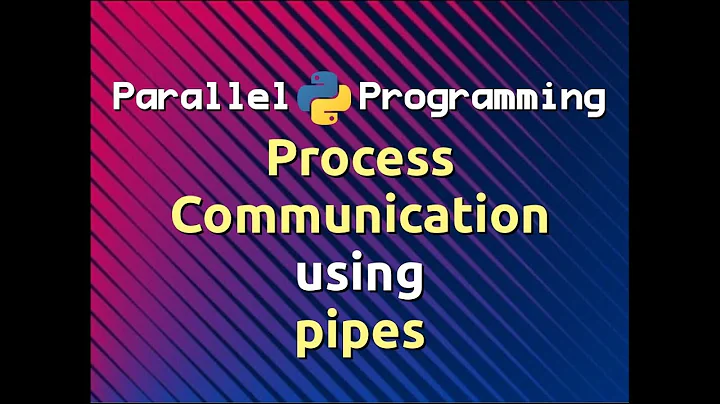How to send a simple string between two programs using pipes?
Solution 1
A regular pipe can only connect two related processes. It is created by a process and will vanish when the last process closes it.
A named pipe, also called a FIFO for its behavior, can be used to connect two unrelated processes and exists independently of the processes; meaning it can exist even if no one is using it. A FIFO is created using the mkfifo() library function.
Example
writer.c
#include <fcntl.h>
#include <sys/stat.h>
#include <sys/types.h>
#include <unistd.h>
int main()
{
int fd;
char * myfifo = "/tmp/myfifo";
/* create the FIFO (named pipe) */
mkfifo(myfifo, 0666);
/* write "Hi" to the FIFO */
fd = open(myfifo, O_WRONLY);
write(fd, "Hi", sizeof("Hi"));
close(fd);
/* remove the FIFO */
unlink(myfifo);
return 0;
}
reader.c
#include <fcntl.h>
#include <stdio.h>
#include <sys/stat.h>
#include <unistd.h>
#define MAX_BUF 1024
int main()
{
int fd;
char * myfifo = "/tmp/myfifo";
char buf[MAX_BUF];
/* open, read, and display the message from the FIFO */
fd = open(myfifo, O_RDONLY);
read(fd, buf, MAX_BUF);
printf("Received: %s\n", buf);
close(fd);
return 0;
}
Note: Error checking was omitted from the above code for simplicity.
Solution 2
From Creating Pipes in C, this shows you how to fork a program to use a pipe. If you don't want to fork(), you can use named pipes.
In addition, you can get the effect of prog1 | prog2 by sending output of prog1 to stdout and reading from stdin in prog2. You can also read stdin by opening a file named /dev/stdin (but not sure of the portability of that).
/*****************************************************************************
Excerpt from "Linux Programmer's Guide - Chapter 6"
(C)opyright 1994-1995, Scott Burkett
*****************************************************************************
MODULE: pipe.c
*****************************************************************************/
#include <stdio.h>
#include <stdlib.h>
#include <string.h>
#include <unistd.h>
#include <sys/types.h>
int main(void)
{
int fd[2], nbytes;
pid_t childpid;
char string[] = "Hello, world!\n";
char readbuffer[80];
pipe(fd);
if((childpid = fork()) == -1)
{
perror("fork");
exit(1);
}
if(childpid == 0)
{
/* Child process closes up input side of pipe */
close(fd[0]);
/* Send "string" through the output side of pipe */
write(fd[1], string, (strlen(string)+1));
exit(0);
}
else
{
/* Parent process closes up output side of pipe */
close(fd[1]);
/* Read in a string from the pipe */
nbytes = read(fd[0], readbuffer, sizeof(readbuffer));
printf("Received string: %s", readbuffer);
}
return(0);
}
Solution 3
dup2( STDIN_FILENO, newfd )
And read:
char reading[ 1025 ];
int fdin = 0, r_control;
if( dup2( STDIN_FILENO, fdin ) < 0 ){
perror( "dup2( )" );
exit( errno );
}
memset( reading, '\0', 1025 );
while( ( r_control = read( fdin, reading, 1024 ) ) > 0 ){
printf( "<%s>", reading );
memset( reading, '\0', 1025 );
}
if( r_control < 0 )
perror( "read( )" );
close( fdin );
But, I think that fcntl can be a better solution
echo "salut" | code
Solution 4
What one program writes to stdout can be read by another via stdin. So simply, using c, write prog1 to print something using printf() and prog2 to read something using scanf(). Then just run
./prog1 | ./prog2
Solution 5
int main()
{
char buff[1024] = {0};
FILE* cvt;
int status;
/* Launch converter and open a pipe through which the parent will write to it */
cvt = popen("converter", "w");
if (!cvt)
{
printf("couldn't open a pipe; quitting\n");
exit(1)
}
printf("enter Fahrenheit degrees: " );
fgets(buff, sizeof (buff), stdin); /*read user's input */
/* Send expression to converter for evaluation */
fprintf(cvt, "%s\n", buff);
fflush(cvt);
/* Close pipe to converter and wait for it to exit */
status=pclose(cvt);
/* Check the exit status of pclose() */
if (!WIFEXITED(status))
printf("error on closing the pipe\n");
return 0;
}
The important steps in this program are:
- The
popen()call which establishes the association between a child process and a pipe in the parent. - The
fprintf()call that uses the pipe as an ordinary file to write to the child process's stdin or read from its stdout. - The
pclose()call that closes the pipe and causes the child process to terminate.
Related videos on Youtube
Admin
Updated on July 08, 2022Comments
-
 Admin almost 2 years
Admin almost 2 yearsI tried searching on the net, but there are hardly any resources. A small example would suffice.
EDIT I mean, two different C programs communicating with each other. One program should send "Hi" and the other should receive it. Something like that.
-
Jerry Coffin about 14 yearsPresumably you don't mean something like
ls | grep ".o"? Perhaps a bit more explanation of what you do mean would help... -
Stephen about 14 yearsCome on man... a little effort. Google "c pipes example code". The first result is exact: tldp.org/LDP/lpg/node11.html
-
 Admin about 14 yearsI want communication between two completely different programs. I was not able to find a resource for that.
Admin about 14 yearsI want communication between two completely different programs. I was not able to find a resource for that. -
Judge Maygarden about 14 yearsIf you are not forking a process, then you need to look at "named pipes".
-
-
Pithikos over 9 yearsWhat is considered related processes?
-
MSalters over 9 yearsProbably processes which are related via one or more parent/child relations (e.g. includes siblings). The common ancestor would have created the two ends of the pipe. Unrelated processes lack that common ancestor.
-
 gsamaras over 9 yearsThis will not work if the reader kicks off first. A quick fix would be to put the
gsamaras over 9 yearsThis will not work if the reader kicks off first. A quick fix would be to put theopen()of the reader inside a loop. However +1 because you provide a two programs example. -
 David Karlsson about 9 yearsI take it this example needs some tweaking to work on windows? unistd.h being POSIX and all...
David Karlsson about 9 yearsI take it this example needs some tweaking to work on windows? unistd.h being POSIX and all... -
jschmier about 9 yearsYes, it will need tweaking for Windows. The Wikipedia article on named pipes discusses some of the Unix/Windows differences and a quick Google search can help with the Windows implementation.
-
cmm about 9 yearsI think this example misses the point of the question, although I grant that the "converter" program is a different program. The first comment addresses communication between completely independent programs that do not have a sibling/parent/second-cousin relationship.
-
Mohsin over 7 yearsHey Stephen, anyway I can use this code for two different functions? meaning writing to the pipe is done in one function and reading the pipe in another function?? a working code like this would be appreciated.
-
Mohsin over 7 years@gsamaras hey man, how will we run this code I have no idea about socket programming, can you help me out?
-
 gsamaras over 7 yearsI am sorry @Mohsin (great name!), but I haven't touched these for a while..I mean I barely remember how did I answer this, let alone sockets. Good luck!
gsamaras over 7 yearsI am sorry @Mohsin (great name!), but I haven't touched these for a while..I mean I barely remember how did I answer this, let alone sockets. Good luck! -
Mohsin over 7 years@jschmier how will we exit from the continuous loop? I'm trying to implement between two functions once one of the functions sends the string and the other receives the string, it should exit. How can we do that?
-
Aelian almost 6 yearsMinor improvement: open calls block until the other side is open-ed. Might need " | O_NONBLOCK" in a real applications if they need to continue, do other things and read / write later, e.g. on a timer.
-
 goodman over 4 yearsCan we pass std::string variable as a parameter in read and write methods ?
goodman over 4 yearsCan we pass std::string variable as a parameter in read and write methods ?






